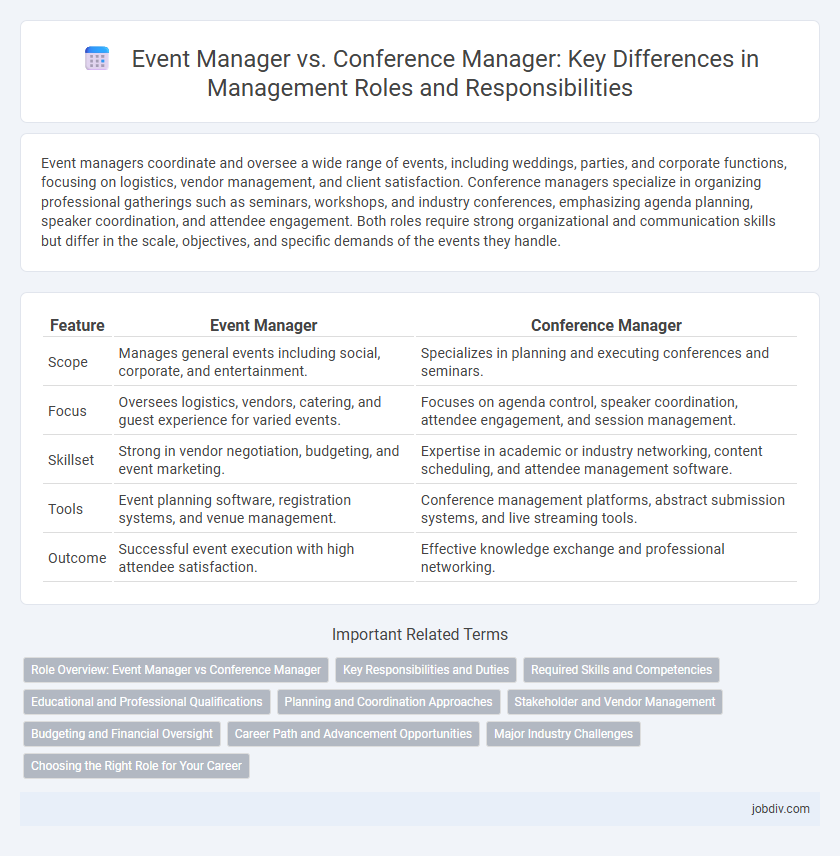Event managers coordinate and oversee a wide range of events, including weddings, parties, and corporate functions, focusing on logistics, vendor management, and client satisfaction. Conference managers specialize in organizing professional gatherings such as seminars, workshops, and industry conferences, emphasizing agenda planning, speaker coordination, and attendee engagement. Both roles require strong organizational and communication skills but differ in the scale, objectives, and specific demands of the events they handle.
Table of Comparison
| Feature | Event Manager | Conference Manager |
|---|---|---|
| Scope | Manages general events including social, corporate, and entertainment. | Specializes in planning and executing conferences and seminars. |
| Focus | Oversees logistics, vendors, catering, and guest experience for varied events. | Focuses on agenda control, speaker coordination, attendee engagement, and session management. |
| Skillset | Strong in vendor negotiation, budgeting, and event marketing. | Expertise in academic or industry networking, content scheduling, and attendee management software. |
| Tools | Event planning software, registration systems, and venue management. | Conference management platforms, abstract submission systems, and live streaming tools. |
| Outcome | Successful event execution with high attendee satisfaction. | Effective knowledge exchange and professional networking. |
Role Overview: Event Manager vs Conference Manager
Event managers coordinate a wide range of events including weddings, corporate parties, and festivals, focusing on logistics, vendor management, and client satisfaction to ensure smooth execution. Conference managers specialize in planning and overseeing professional gatherings such as trade shows, seminars, and workshops, emphasizing agenda coordination, speaker arrangements, and attendee experience. Both roles require strong organizational skills, but conference managers prioritize content delivery and networking facilitation within business or academic environments.
Key Responsibilities and Duties
Event managers oversee the entire planning and execution of diverse events such as weddings, festivals, and corporate gatherings, ensuring smooth logistics, vendor coordination, and budget management. Conference managers specialize in organizing professional meetings, handling aspects like speaker arrangements, attendee registration, session scheduling, and technical support to facilitate knowledge sharing and networking. Both roles demand strong organizational skills and stakeholder communication, but conference managers require in-depth expertise in meeting facilitation and industry-specific content management.
Required Skills and Competencies
Event managers require strong organizational skills, multitasking abilities, and expertise in logistics coordination to handle diverse event types such as weddings, parties, and corporate gatherings. Conference managers need advanced skills in stakeholder communication, program planning, and technology integration to manage complex agendas, speaker coordination, and attendee engagement within professional settings. Both roles demand proficiency in budgeting, vendor negotiation, and crisis management, but conference managers prioritize specialized knowledge in industry-specific content and audiovisual solutions.
Educational and Professional Qualifications
Event managers typically hold a bachelor's degree in hospitality, business administration, or marketing, with certifications like CMP (Certified Meeting Professional) enhancing their credentials. Conference managers often possess specialized education in event management or communications, coupled with experience in academic or corporate settings, and may acquire certifications such as CMM (Certified Meeting Manager). Both roles benefit from strong project management skills and familiarity with event technology platforms to ensure successful execution.
Planning and Coordination Approaches
Event managers emphasize versatile planning and coordination, adapting strategies to diverse event types such as festivals, corporate gatherings, and weddings. Conference managers specialize in detailed agenda development, speaker coordination, and attendee engagement to ensure seamless information flow and networking opportunities. Both roles require strong organizational skills, but conference managers focus more on content scheduling and stakeholder communication.
Stakeholder and Vendor Management
Event Managers coordinate a diverse range of stakeholders, including sponsors, venues, and attendees, ensuring seamless communication and alignment with event objectives. Conference Managers focus specifically on managing relationships with academic, professional, or industry stakeholders, alongside specialized vendors such as audiovisual providers and keynote speakers. Both roles require strong vendor negotiation skills, but Conference Managers typically handle more complex logistical arrangements to accommodate multi-day schedules and session tracks.
Budgeting and Financial Oversight
Event Managers oversee the entire budgeting process, including cost estimation, vendor negotiations, and financial tracking to ensure events stay within budget. Conference Managers focus specifically on managing registration fees, sponsorship funds, and detailed conference-related expenses to maximize financial efficiency. Both roles require rigorous financial oversight but differ in scope and financial detail management tailored to event type.
Career Path and Advancement Opportunities
Event Managers typically oversee diverse events such as weddings, festivals, and corporate parties, gaining broad experience in logistics, vendor coordination, and client communication that builds a versatile skill set. Conference Managers specialize in organizing professional gatherings like seminars and trade shows, often advancing through roles focused on strategic planning, speaker coordination, and attendee engagement within specific industries. Career advancement for Event Managers may lead to senior roles in event production companies or entrepreneurship, while Conference Managers frequently progress into executive positions in corporate event strategy or specialized conference consulting.
Major Industry Challenges
Event managers face major industry challenges such as coordinating diverse vendor contracts and managing real-time attendee engagement across multiple platforms, requiring agile problem-solving and tech-savviness. Conference managers contend with complex logistical hurdles including scheduling high-profile speakers, ensuring seamless AV integration, and maintaining regulatory compliance for large-scale, multi-day events. Both roles demand adept crisis management skills amid shifting health guidelines and evolving virtual event technologies.
Choosing the Right Role for Your Career
Event managers oversee diverse events such as weddings, corporate parties, and product launches, requiring strong multitasking skills and flexibility across various industries. Conference managers specialize in organizing large-scale academic, business, or industry conferences, focusing on detailed planning of speakers, schedules, and venues to ensure smooth professional gatherings. Choosing between these roles depends on your interest in either broad event coordination or specialized conference logistics, aligning with your career goals and expertise areas.
Event Manager vs Conference Manager Infographic

 jobdiv.com
jobdiv.com